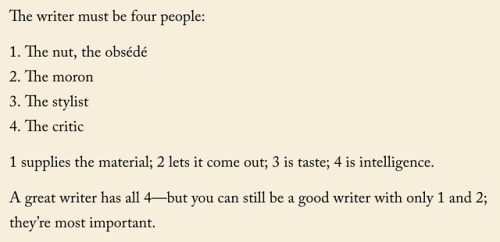Susan Sontag’s Writing On Writing, From Her Journals

susan sontag’s writing on writing, from her journals
More Posts from Surmayah and Others



on the inevitable and loving despite, despite // a revisitation of this
various wikipedia pages / carl sagan / why the sun chases the moon / war of the foxes - richard siken / drunk drivers, killer whales - car seat headrest / saturn - sleeping at last / pale blue dot, photo from voyager / lighthousekeeping - jeanette winterson / ann druyan / new york times / neil degrasse tyson / david jones
The assertion that the Mughals were colonizers is a misapplication of the term, one that conflates conquest with colonialism. Colonialism, as defined, involves the systematic exploitation of a territory for the benefit of a distant metropole, often accompanied by the imposition of foreign cultural and political structures while maintaining a clear separation between the colonizer and the colonized. The Mughals, however, do not fit this mold. They were not extractive outsiders but rather rulers who embedded themselves into the fabric of India, becoming part of its history rather than remaining external exploiters.
Let’s begin with intent. The Mughals did not arrive in India with the goal of extracting wealth to enrich a distant homeland. Unlike the British, who treated India as a resource colony to fuel their industrial revolution, the Mughals made India their home. Babur, the founder of the dynasty, may have been a conqueror, but his descendants—Akbar, Jahangir, Shah Jahan, and even Aurangzeb—saw themselves as Indian rulers. They built their capital cities in India, patronized Indian arts, and integrated themselves into the subcontinent’s political and cultural landscape. This is not colonialism; it is empire-building, a process that has been a recurring theme in Indian history long before the Mughals arrived.
On the matter of cultural imposition, the Mughals were far more syncretic than colonial. Akbar’s policies, in particular, stand out as evidence of this. He abolished the jizya tax on non-Muslims, married Rajput princesses, and incorporated Hindu traditions into his court. His Din-i Ilahi, though short-lived, was an attempt to create a unifying spiritual framework that drew from multiple faiths. While the Mughals did impose Persian as the court language, they did not seek to erase Indian languages or traditions. Persian became a lingua franca, much like English did later, but it coexisted with regional languages and cultures. This is a far cry from the British, who sought to replace Indian systems with their own, often dismissing local traditions as backward.
Economically, the Mughals cannot be equated with colonizers. While it is true that wealth was concentrated in the hands of the elite—a feature common to most pre-modern empires—the Mughals reinvested their wealth in India. They built monumental architecture, funded arts and literature, and developed infrastructure. The British, by contrast, extracted wealth on an unprecedented scale, draining India’s resources to fuel their own industrial growth. The decline of India’s share of global GDP from 25% under the Mughals to 3.4% under the British is a stark reminder of this difference. The Mughals may not have created an egalitarian society, but they did not impoverish India for the benefit of a foreign power.
As for governance, the Mughals were far more inclusive than colonial powers. Akbar’s court, while dominated by Turani and Irani nobles, included Indian Hindus and Muslims. This was a significant departure from the British, who excluded Indians from positions of real power until the very end of their rule. The Mughals’ administrative system, the mansabdari, was open to Indians, and many Rajputs and Marathas rose to prominence within it. The British, on the other hand, maintained a rigid racial hierarchy, treating Indians as subjects rather than partners.
Finally, let’s address the cultural legacy. The Mughals are remembered not as foreign occupiers but as integral to India’s history. Their architecture, from the Taj Mahal to the Red Fort, is celebrated as part of India’s heritage. Their contributions to art, literature, and cuisine are woven into the fabric of Indian culture. The British, by contrast, left behind a legacy of division and exploitation. Their railways and administrative systems, while significant, were designed to serve their own interests, not India’s.
In conclusion, to label the Mughals as colonizers is to misunderstand both their role in Indian history and the nature of colonialism itself. They were conquerors, yes, but they were also builders, patrons, and, ultimately, participants in India’s story. The British, by contrast, were extractive outsiders who never saw India as anything more than a colony. The Mughals may not have been perfect rulers, but they were not colonizers. To conflate the two is to oversimplify a complex history—one that deserves to be understood on its own terms.
Not another post whining about why “mUgHaLs WeRe nOt cOlOnizErs” like girl, they were literally foreign invaders who forced you to speak their language, broke your temples, tried eradicating your culture and collected zizya taxes motivated by religious bigotry in hopes of forcing your people to convert! At least have some shame and consideration for your ancestors.

i don't know who needs to hear this, but guilt, self-hatred and shame are not sustainable sources of growth and healing. you can't hate yourself into feeling better, or being better. you can't repeatedly punish yourself for your flawed humanity and expect wholesome results.
if you're feeling powerless right now—and god knows I am—here's a reminder you can donate to the National Network of Abortion Funds, the Trans Law Center, Gaza Soup Kitchen, the Palestine Children's Relief Fund, and hundreds of other charities that will work to mitigate the damage that has been and will continue to be inflicted
life continues. we still have the capacity to do good, important work. that matters
-
 ghetsispikachu liked this · 3 weeks ago
ghetsispikachu liked this · 3 weeks ago -
 crashingmeteorz liked this · 4 weeks ago
crashingmeteorz liked this · 4 weeks ago -
 cryptidlatias reblogged this · 4 weeks ago
cryptidlatias reblogged this · 4 weeks ago -
 aeoneskova liked this · 4 weeks ago
aeoneskova liked this · 4 weeks ago -
 zakounenharma reblogged this · 4 weeks ago
zakounenharma reblogged this · 4 weeks ago -
 midnite-enjoyer reblogged this · 4 weeks ago
midnite-enjoyer reblogged this · 4 weeks ago -
 faith-orise reblogged this · 4 weeks ago
faith-orise reblogged this · 4 weeks ago -
 faith-orise liked this · 4 weeks ago
faith-orise liked this · 4 weeks ago -
 tenor-clef liked this · 4 weeks ago
tenor-clef liked this · 4 weeks ago -
 ortustheninth liked this · 4 weeks ago
ortustheninth liked this · 4 weeks ago -
 cyreneduvent reblogged this · 4 weeks ago
cyreneduvent reblogged this · 4 weeks ago -
 master-meriadoc liked this · 4 weeks ago
master-meriadoc liked this · 4 weeks ago -
 dopegrandma liked this · 4 weeks ago
dopegrandma liked this · 4 weeks ago -
 roguellie reblogged this · 4 weeks ago
roguellie reblogged this · 4 weeks ago -
 roguellie liked this · 4 weeks ago
roguellie liked this · 4 weeks ago -
 disastergenius liked this · 4 weeks ago
disastergenius liked this · 4 weeks ago -
 quarter0master liked this · 4 weeks ago
quarter0master liked this · 4 weeks ago -
 rithmah reblogged this · 4 weeks ago
rithmah reblogged this · 4 weeks ago -
 strumwulf liked this · 4 weeks ago
strumwulf liked this · 4 weeks ago -
 doomfisthero reblogged this · 4 weeks ago
doomfisthero reblogged this · 4 weeks ago -
 princeoflife123 liked this · 4 weeks ago
princeoflife123 liked this · 4 weeks ago -
 princeoflife123 reblogged this · 4 weeks ago
princeoflife123 reblogged this · 4 weeks ago -
 watery-sun liked this · 4 weeks ago
watery-sun liked this · 4 weeks ago -
 night-lie liked this · 4 weeks ago
night-lie liked this · 4 weeks ago -
 cobaltsoulsearcher reblogged this · 4 weeks ago
cobaltsoulsearcher reblogged this · 4 weeks ago -
 cobaltsoulsearcher liked this · 4 weeks ago
cobaltsoulsearcher liked this · 4 weeks ago -
 leggolibri liked this · 4 weeks ago
leggolibri liked this · 4 weeks ago -
 wardensantoineandevka reblogged this · 4 weeks ago
wardensantoineandevka reblogged this · 4 weeks ago -
 ysatis liked this · 4 weeks ago
ysatis liked this · 4 weeks ago -
 savourtheorgans reblogged this · 1 month ago
savourtheorgans reblogged this · 1 month ago -
 fuckyouyouufuckingfuck liked this · 1 month ago
fuckyouyouufuckingfuck liked this · 1 month ago -
 forget-them-wendy liked this · 1 month ago
forget-them-wendy liked this · 1 month ago -
 kreigwrites liked this · 1 month ago
kreigwrites liked this · 1 month ago -
 level1cleric reblogged this · 1 month ago
level1cleric reblogged this · 1 month ago -
 level1cleric liked this · 1 month ago
level1cleric liked this · 1 month ago -
 yao-oh-no reblogged this · 1 month ago
yao-oh-no reblogged this · 1 month ago -
 writingsfromspace reblogged this · 1 month ago
writingsfromspace reblogged this · 1 month ago -
 diabolical-blue liked this · 1 month ago
diabolical-blue liked this · 1 month ago -
 bunnywolfwritesabook liked this · 1 month ago
bunnywolfwritesabook liked this · 1 month ago -
 the-bitch-in-the-tower liked this · 1 month ago
the-bitch-in-the-tower liked this · 1 month ago -
 loopyhoopywrites reblogged this · 1 month ago
loopyhoopywrites reblogged this · 1 month ago -
 bytes-and-blessings liked this · 1 month ago
bytes-and-blessings liked this · 1 month ago -
 ettawritesnstudies reblogged this · 1 month ago
ettawritesnstudies reblogged this · 1 month ago -
 lilgaybarista liked this · 1 month ago
lilgaybarista liked this · 1 month ago -
 findme-at1am reblogged this · 1 month ago
findme-at1am reblogged this · 1 month ago -
 succult liked this · 1 month ago
succult liked this · 1 month ago -
 seventy5th liked this · 1 month ago
seventy5th liked this · 1 month ago -
 justmady liked this · 1 month ago
justmady liked this · 1 month ago -
 galamerapple reblogged this · 1 month ago
galamerapple reblogged this · 1 month ago

she/her ▪︎ my mind; little organization
177 posts





